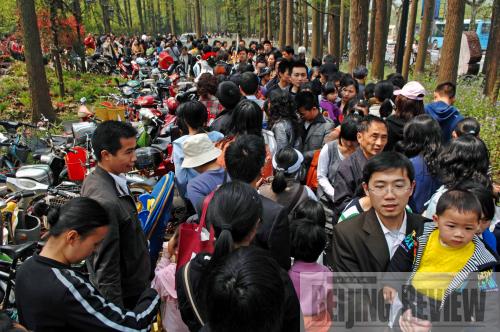|
 |
|
CROWDED PARK: Knowing that the park no longer charges admission fees, visitors rush to Prince Bay Park in Hangzhou, Zhejiang Province (WU GUOFANG) |
SOE Profits an Enigma
After China established a tax-sharing system in 1993, state-owned enterprises (SOEs) were allowed to not submit profits to the state coffer. This policy remained effective until 2003 when the government stipulated that SOEs should give part of their profits, generally between 5 percent and 10 percent, to the state.
As for the rest of their profits, most SOEs said that they had invested the money into production expansion and other necessary programs. However, various statistics available indicate that their claims may not tell the truth.
First, these SOEs are "contributing" funds to a range of overseas investors, by selling stocks at low prices and offering high dividend yields abroad, while doing the reverse at home. Second, a large sum of SOEs' profits go into the pockets of their staff, especially senior executives. Statistics show that, in 2005, the payroll of 8.33 million employees in state-owned monopoly enterprises, who make up 8 percent of the country's workforce, accounted for 55 percent of the national total. Third, top executives' business expenses are like bottomless black holes with no one knowing just how much has actually been funneled into this area.
While collecting money from across the country and curbing the growth of small and medium-sized enterprises, monopoly state-owned enterprises are profiting at the cost of most taxpayers. Only by breaking the monopoly can we ensure that huge profits of SOEs are used for the whole nation.
Zhujiang Evening News
Evading the Tax Man
According to the Chongqing Municipal Local Taxation Administration, of the 128 enterprises with tax arrears in the southwestern city, 70 are real estate companies. These companies have always failed to pay taxes on time.
It seems that tax arrears by real estate companies is a result of the sluggish property market. This typical capital-intensive industry was one of the worst hit in the ongoing economic crisis. However, even when the housing market was booming, tax evasion was already a serious problem in the sector. A survey by the Beijing Municipal Local Taxation Administration showed that 66 percent of local real estate companies evaded tax payments between 2003 and 2005. This indicates that real estate companies' tax evasion practice has little to do with the market situation.
The current business model of the real estate sector makes tax evasion easy for developers. Generally speaking, when a property developer launches a housing project, it will incorporate a new company to manage the project's construction and sales. Once this process is completed, the company will be liquidated. In this way, taxes worth billions of yuan are evaded.
While tax evasion and tax in arrears have become a commonplace in the real estate sector, which is widely known for its huge profits, the state must carry out sweeping overhaul immediately to regulate this sector.
Guangzhou Daily
Don't Stifle College Grads
Faced with a chilly economic climate, many college graduates are choosing to start up their own business instead of hunting for jobs. However, in the economic development zone of west China's Xi'an, Shaanxi Province, start-up companies are now subject to various administrative fees, and they are always fined for small errors.
For years, although many graduates have the will to be their own boss, eventually, fewer than 1 percent of them actually start up their own business, compared to the high proportion of 23 percent in the United States. Of the 1 percent, only 2.4 percent succeed in their first attempt.
College graduates do not have enough capital to sustain the costs involved in running a business, so the government should offer advice and services to help them. Only in a more favorable environment will more graduates choose to start up their own business, which will also help lessen the burden on the government.
Qilu Evening News
More Free Parks Needed
In March, the Prince Bay Park, which is known as the most beautiful public area in east China's Hangzhou, began to offer free admission to tourists. In only 20 days, the park, which is only the size of three football fields, received 720,000 visitors, leading to the loss of half of the park's grass surface.
Some people said that this damage was all due to the free access and therefore suggested parks should not adopt this policy. However, if we look at this problem carefully, we can see that the problem actually lies in the limited number of fee-free parks. After all, the waiving of ticket fees can save tourists a lot of money. The rush into the park indicates that the number of free parks in this region is far from enough for tourists. This is a common problem throughout the country.
Actually, this park used to experience several peak visiting times, such as during the annual tulip show. But thanks to precautions, there were no big losses. The park should have expected to see a sharp rise in visitors after it decided to scrap entrance fees and thus have made preparations to handle large crowds. Unfortunately, park managers failed to do so.
Meanwhile, we have to admit that the tourists did not behave well in the park. If they all had good manners, this beautiful park would have not been trampled.
Free access to urban parks is an irreversible trend. To avoid similar consequences, we need to strengthen park management, and visitors should also discipline themselves. We should not stop the free admission program just because some visitors do not behave well.
Workers' Daily | 